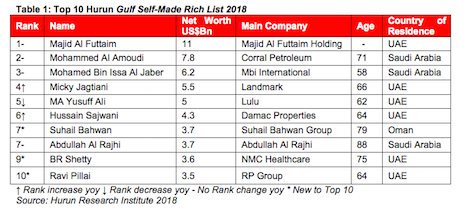The Gulf states are among the most rapidly developing countries in the world, with new billionaires arising from the region each year.
As a subset of its annual Global Rich List, Hurun Report has released a new index of self-made billionaires in the Gulf States. The United Arab Emirates leads the pack with the most new billionaires, though several other countries have also seen their wealthy elite class growing.
“Self-made entrepreneurs in the Gulf are growing fast," said Rupert Hoogewerf, chairman and chief researcher of Hurun Report, Shanghai, China. "Almost half the self-made billionaires residing in the Gulf are immigrants, especially from India, who have settled here.”
Self-made money
The Gulf States are home to some of the wealthiest people in the world. Saudi Arabia, Qatar, Oman and others have all flourished over the last few decades thanks to oil and other natural resources.
Last year, Hurun’s Global Rich List ranked the richest self-made billionaires in this region for the first time. This year, Hurun has brought the list back to show just how quickly this region’s wealth has grown.
The United Arab Emirates leads the pack with 61 percent of the region’s billionaires, 22 to be exact.

The richest people in the Gulf States. Image credit: Hurun
This is a commanding lead over the second place spot, Saudi Arabia, which has nine billionaires, and third-place Oman, which has only three.
The total of self-made billionaires in the region now sits at 36, up nine from the previous year. Unsurprisingly, Dubai, the city known for its lavish accommodations and ostentatious building designs, is the capital for wealth in the region with 16 of the area’s 26 billionaires being found there.
A surprising statistic is that many of the region’s billionaires are immigrants from India. Thirty-six percent of the self-made billionaires in the Gulf States are immigrants, with 13 from India and two from the U.K.
Foreign investment
The Gulf States’ growth as a wealthy region has caused many luxury brands to begin prioritizing it as an area of operation.
For example, online retailer Farfetch has joined forces with Chalhoub Group to increase Middle Eastern consumers’ access to luxury brands via ecommerce.
Chalhoub Group partners with luxury brands to establish a presence in the Middle East because having a local understanding is essential to awareness building. Chalhoub Group’s retail, distribution and marketing knowledge of the Middle East paired with Farfetch’s ecommerce and logistics prowess will open up the market to luxury brands (see story).

The richest countries in the region. Image credit: Hurun
The region has also become a focus for luxury travelers from China. The rising sophistication of Chinese travelers has resulted in a retail and tourism boom in the Middle East and North Africa, as visitors seek new destinations off the beaten path.
According to a new report by The Luxury Conversation, and commissioned by Reuters Communications, the Middle East and North Africa (MENA) region is no longer lagging in popularity among Chinese tourists. Most often, tourism from China is linked to Europe and North America, but increasingly, due primarily to visa policies, infrastructure and experiential trends, Chinese tourists are booking trips to MENA, opening opportunities for luxury brands and hospitality (see story).
{"ct":"XIYTw3DSTeCV3cok+H43oOdGW9mJ8Igjw6PFIuGfZyZ1sBXJfVtnu36xzuq1GXSdRbDm3lwx3x9iGUyc9v1Ku8g\/upSMEU+F+\/Ln5nljy3JcAcF\/Fvqb7\/c0Cv8moD8O7Yz8tm5PFl6i1CkK5fWbY0TO0Zkyzj33zJpnREd2VT4w1YNZ2XnNF2SRxu1U7CCHu3iWEF7EWmjGv9fQ3rOvHOB6b2ouDSk04ZZx9cVEChQIWZkAuoJ\/hV\/YsfKgzsOV6oR876trIbgcb1n7lYC2cJinJQL8L8XwicO0iEx\/IAB3bkYv9uB\/2wjoVJEeR+2t2wB+7QEO3Vo2q1fInC8fyODl5E5uwYWJJ456V66T23HL+Zxmsi8ti0hmBObFz6vuM8XYuwAb27VCqiO7mR5ah7KRfn10YKhGLLA6uVKKK2kjOny9pbf76LCMI1NduocQbUfPjpkarmjkZvXzfR8ixR9weXK91pqRraEbBLRjYrdxNDpk4Tgmal4e1WTUgiJ+fx7tNxe3NVLOwOode+2K45qVDOYWCrce+F\/P75fWSXNx+01mOUlJZetr\/N6Q6gASP0tkIt1Wl+aGQu68kOy\/cCqFmjwuDhkr3zHEbHIlKq2hTkI9M\/m6gWn69PdX3N1KmRfh6it68YwjXUYxsT3q0KJ7Iruf\/sp5UY16nfQUHyT8a9PVhnn8l04Gf\/RpoHYiRrBpH62wsIiIAQEPdjnCoqEqeXHqZB24ytt58lIFHvbwTqwiqOtZasCyWjy2eCiVYWs+B63hp\/0eWQB9q9g26E7c0iVHTmLeMXkQ98Hvkc9zyVoYKnShim+eC3\/ueVNoDCHBLW+zOh0YcStm5a\/mrsPhOqphYbC2CXWu5AzS4FhH8sJyiaw9uebxDbhJDOMuGPXSl+ZHrPYIB4mL6mIFDNHbASxTQmio7uhaTL5DqpHqYAgEvoYJ3x\/1SAKLH6fOVx20HfPd992GDVNQ8p2\/QPAnrTJPYFjxObCf6kw2hNQCM12rlYQhs5kYgT4uPzJlPRol2RxNL5L7rniEgNeuJ52B2h0kjlekUQHtwCzUdRbR4QBFe5RAFeQ2cD8jNmEtUtAZohBEFMVgzg4wFU6vNRiuxvpcyGyE6r20B+uAS5hsHt9aS3CR6X5Ruk2w8eg9WNLaFbZeMrj9s3dZ9UewCtBU2f906TT1Fy+okNrjB9NS3wNoKSf9qtkqSDGQ4eld9c5Clg2H9yG8fcsVII5L7Ka1zrGYGTH1pvnaeuhqQBagsrKt5NUQ\/S8OMQ0ZZnytD69Epy4I6cJ6YpzLrWfuoj8xW80J+8p8Rrqno3VvBTf+gLvDyPOKnftsEU4NEDh3lhT\/alYMvoUmpqJshoI47Bacu+RadaMfK3Q7r4Es5hJj9kvHRj6RNXqTmctNvP7Cd7mM0qpSvdCxKzhNxc79nBk4wdr+mEstTKgT5C3\/xmcjksatDbyfEh5BUK8fOJT6zW98IN7FPxqmgz4OnpELQFtF1ZVKB5gY75EVVvutlGg53vBqloUqJ+yCUzpw34vXRKBKfJN6O3b6OZv1EjeRksVUAqj8PaLFApbprmGfHdzV+d8L2vfe4j9N+TTlUysS8Mb4I\/NPpUVsxTF1oWa12ykMw3i0k7Y4xb6MOxzq6tiW0g+eqGCX5d8vWEa0omDG1tBAhsbISG+jAgH8phoFb5vHKFe9mJ+N0kjmluQEOLa5zHBhmIKWwXox9DgTGGsvYeYYZFRAVUlZjlhBuQshqxVSe2k9ApHMMX5pTlKfb7vsLow46ZIDJvgg\/eJQb8bJuWpsbtTO3DO001nc0nqJ7kvQX9VWfJJl3l3HaGZnJXKTLWVCWxN\/80jNZ\/kShv4i6dcVz1uQ+NZELwl2u2nMdURE81Q\/EFN0AI6veAxFhUlchpbtVLc4TIEKkyw948KkBbH38iNporDHI0TzWsTVSJMEU1ngdcrQSEG1Uu78q6h3YG8ejggn\/QP1Mwq1cS47Pw3dJevNGv8ZqrklAoq+9eXYgxmYCj4DYQrq+oc6fjScFnJd5Bbt3OesdcKsAHVlEApNpqtihuWBujyQLEcU\/Mc06B2S2qbOSO3Ol8cMkXyi4D5KrToOoWMpMFTB7LWB3Y9bSn4OyLsVlRcBh1QBskystDNs99AsMEgHNrYTM5QWNQRof8LwxqAng\/prixfVYKxbGvNgA7V9Z5Y2y8WzPZ80caHClHpLbj6FRJLalxQ10QP8UbKQ0zDV0ihioxU0LVPc0wHQuptsq2rPcLhf4tPEeKchF2XT563K3Tne\/6p\/UKgYYovhaAZr59HRZJAyDlPYThv7m9qZ3NejwMqzde0Cmh2zn0mL3XHqDUlEGqyiknzy1FV14LvWojaKDbpBpBndEvlnQdVGxeCmMuaIxWtqfCgk3GjCqcClvorwG\/04j\/jan42lUQIOg7ZXi2wvxXCBvVDUj9ENv6MMbHRrgSHSv5p21KpqKw4V4ffcr2hpZ0tidQWdWg+FGEz4HKGA7wUmT8KDh+XjDfBTQNxgzcS91MMRdSowefloV+cGMDkeUUtJq6JbEWDsC9Ii+MNhHDu9U4xc65mYZeT1HoTNqrDzmW69G9\/tyzc6nNrgU\/fdKLtuBsQQQmFnt+pOCoAI8MNI9jIcK1t8HgAZWLHK03lJgx69wjg73EiLWCvepR2vsRgcWprvA4WLeuuMWc31UALknyK2L\/0HH5ZY3r+TocgfgCJUFqAJvsBzykSJvDQO2QEAbnfiGHsHtchfMCtGxJzrbdYrAPRwNaU\/bjOZI6MEJO11b2Evg0RhwKhH7+WPLPjiXyJYOJbGUCRf2NW2J9grwJH+5GkSMMzJmcZ4vnpKTFfzAdWPAbpVlvWHSX90I1AvSwL2mwo5f\/Gg+NA8mRWTZRw9EoQ3nDzpSh9zE98mYxszkjvZh+ynb0KVWsaXTRo4CaB8WNtrOZFhhw\/\/yzKppSfw4+TahUcDOs6KwKE+MDFFrjFpkUVrScyF+4bmZhG41lTHH8ZkKxeUBLUc6NeuY9BPb3KRoTvx3E3zsI\/4rRhphOxGLK6eUetWX5N6fwwCYzBw20CRCtRzgkKZ37dg8A0X1lMGUho37wL8LZhCNVuu0CWjX24+qJR2VK0eGRBA4YZiLhKmKEWemqT02vDeapHvbUMxylkbdEZQq4GucLU+L8d1UWp5ij\/UxnHHsOssfVZu5N\/s+7MFTWdF+0kxGI2MNvpOebToXTbfvZWODfKDQJnxt2gZPchqI1o686iLRuHGjK4RCImz5N4t9RFpteKadCdLZ6py4gk8TBkdhKfi9WLZbTUQ4QB7Z1grD59W2QSL6pMNOcnAytcN7a0KIn2TW7Tz0wz43dpxE1K4Ksz4R8j5\/9hQJWwFbBnOeflaGWOmwEgRABl+H6E1ZOFhDn4dWrG66cl2bJW\/BgOH8e0wlLpzyPyuf81t4WQKN\/ghr2LYXSscQ35L1jyJ1VXS1PeKIyoQQCBoKK+Jl2j5kZKGB8U2kSvtkn5o2s2IrNqvI+\/E0sTzbkj4C2ANxH2vPViGqephTC5ysWJgdT4Mlc8Cm+Fwq8+kl2svQjeMgiWUpQ4JWhB+3HBXWxN2VSeCjeVUzsKhEfKKTD8u8Drwx+yzkVJ8+v2wjbY1H9MvLjY\/lUXKe\/osxiXfTvkycrx0a+Z1lgJDCZ+8J3F8msLtebh57srMT3s1d+0viEy8L+zfUhyOo3gax0\/Bchbv9pEHxZCHQ\/4umz5jEbD78EF+smiHyFPTvXcMOgxslzF0vHZqACKGhM4ZK5Ja7CwGZcTA7Oo3iu0JgeBonMiwgg4bUmoVEm1iwXXDb1J1yfmdrVZn5in80uvUrVatogx2BM+Ed7Sr0WIQPxBAjaFpG2TK7sp2npmffYdRNaTrXMHrwIodzkW3sNx1ciaefCNviysEsIE1LqrygeWoRXIHs8H0A+bzqbZPKDGPuYDUN7G8GqVA02yzquRD+x7Cu\/ePWRozQBg+JuuiAlWz1ds41AEHZK+Wp6lhZz+wxqU7RRjnT6jXkcJrUMD1ySHuZDnJeguMU+4EsoQgNzZ1BlCV9\/ZZcf6p1hSM2iDeF+wVVZBySu+Q3ZjtEVswaEgprxthieH768zu7FiXHEpu7IeRNV8r3WY+sYrS11B6WcBIHXh8EX824NQBS9W0r9tsMgEqBG\/05MR2gR3zjmBKtrZ\/nLBYLIUn0LrFdnxOwO4+9WniaHAoNt6PqCW6\/Pb+jagODJT2+w9HJ\/07\/GXo+wo4D9wdMoP0oF\/xxAFxjRWeHJIqUNrrAvMj\/84eiaM9Oj8affgerLeVboVV7XuZBN0xVnI9PXA04jEBC21UkW+hY5LYtWp2g3vcpYU3F2lchAKBxiMOeLUYrd7fR\/WaXV\/tZcu68a7yaWMsDvtuMupjqmllVwqhxMayr3Qj8aCszB2AnqRKmsLED66leXDF\/mR5HmysR\/EelEbTCYrbLxjdVlpxmWEbvmPwoB7oqdqe8AAXPuS5B7D9hWOaCKDgs0hwlrSpLf4rp0uEvMalF3zrk4A5\/5fx16hjHT2\/d\/3LuS0Kt\/yASO2ScI\/ldq4rowvaYSfLXFKVUJG1UK9gQ\/9TY6rDniVwY4vq+\/YV57q+aHFmZOHm87Vl4D8HokS6VSyxxoHaPhQpA1o8uRzsRi+DNuTcbKNS0L3FtTq0AcaLIpIGkgln\/H2DMUiicr8XQdvePxHB89UWCyMZ1cvRqrve8Lk5EpVX2dYi59egolN0rqZ68ST4WQIydLoYCxEsk97mBMiTC\/tkuzQFxe1yn8tGcB2UOS58vPbCthIcN7H\/uc6Bxjy\/Wfvw1tWXPKRrWlzMbRnMrSLnfTpGO4b9wofSrayC0hzf5RK1FAgu8Z3WD7X74Igp9s6\/I99WCjUR7CH30SXilQAYWu0ezhMsE8suL\/Vjm9ceZOER28zqLiJzp35lpWbXCRCKF3\/xTK0QHW4EpTFSWH0VPlyUhLgBi0Lk7Dqk7kTvDkwZOdkhOEeChTaW5Ety8V\/KhJMScEpOmTSv04MkTIRHXfRRy2OAtpNt6n7BWIHmTAToySyie+7sDDQw1kEMWeh2DVx+x6JpPPwZoexYXIDO3jcILzTz52CLRa8SDimBUTdLqHx0pJGo+jhntykA4kRNsz8XJCeBAtOEqmoT3ArsS2nk4MqFCAfwHy5EIzdWvPVGXCU\/x3UA1beamvoI5nkciAZjTai7sx3NPHQaR9FXHf1VFQHfY4M05ZQhunaWkEDXOr83uQILv1oPEwBSch5m6ZBFHhCEbxwBdfRO92QaU0J433zdhH5CiJ2lM\/7XjECG\/UItqnkK5wZkfMMwoWMPyS8OBAcsS1AucYRag\/WDVJ4f45kns9s\/cN6+b2DyRBGOkJ528G0ldzZASzDO+W6fgEibKQDMG+bX74ci+aIpmER39ICKfnT5fp3O1jluAACM80oEJxxJs8sRGA2sE5Hfqw6Zc6cKnn\/Etix8Cyx646mxxdsMBhSzNQoxApCsuS1cd638C0Q4EG3IgQnxN+wbIjVL1CHJJOKsdBPCBo5vAsHPSjeSazTJmf3SsTmO5mWZbTRabbYfgKcax2KdnWo9ZHWtvIJ6m+JwG2bQ0NvY4MUHW3oH+EsIX6OmDHHs\/9FkaMgyySAnroCSlRep2iv7kInHMxuDqRVloSHrN9UY+tYTaD1t\/PpZUU6wtJY9EhYHh\/Gd5Bd2xcuDAcNJqP35D1VW3OsYiuX26qxUgdlYkJ55cX6LC8rrspLy3cn+2KoWgG+kuRJVmMqW6pN9o2cSJ1jx0Z82gaXmwEE3WIcEyY9sGlSVkfRplE+lH3Zo\/MKxyvVTHXIKYwShbv9lMg\/++9X+6CugYWdKbkxKzXNi++2LXJh+DaJ6q9VcxWXMxizrrA+ie7bISvB9dF2Tthsj1J0Fih3KcxY6R9FYU46+OnpDpqymWvn3jPhYkqpQFhVuDBS3gpC3fBrrNS+tcxksWQFJHuXr7A5Yy0HAyWmXOUZ8BBgfQ\/6SYrdRds3UUTA6C1xjIev9R2PID+IQrOlQDXqLofUJFay1mkJOzlHSy083kNa1EQnHdO43QCxDPUjdO+UB8TiaRlv8QzqR1ECVHAxr+0peMHX8yPoklks7ECOnC9UEZgZ1YG1uqGteogpbOtDTc4or3tIdHNUA0pLBCbeNboGGIgIGKRXiRoT2tZeTmEmamtIa7SZNIT9pYYqgc1Pgxji9ts1ti23fBk1hvsmnv1jANst\/0oxvT1NyMFEKtfFZMNaEpiC5xXeD5sfMuamF3B\/M+\/WkQuXgP4iTtqtaMd2Z4kJOr+8mLb\/lNAXnyWcGfkRe4J2n9PRA8c378R\/wHryab+w2u2js+ZuDzDbL\/V3Vg\/qfyg==","iv":"03220d683c0a3d09b7edc051e2e06ba5","s":"4e8a5f616f5c75af"}

 The Middle East has rapidly become a prime destination for travelers from China and Europe. Image credit: the Luxury Conversation
The Middle East has rapidly become a prime destination for travelers from China and Europe. Image credit: the Luxury Conversation